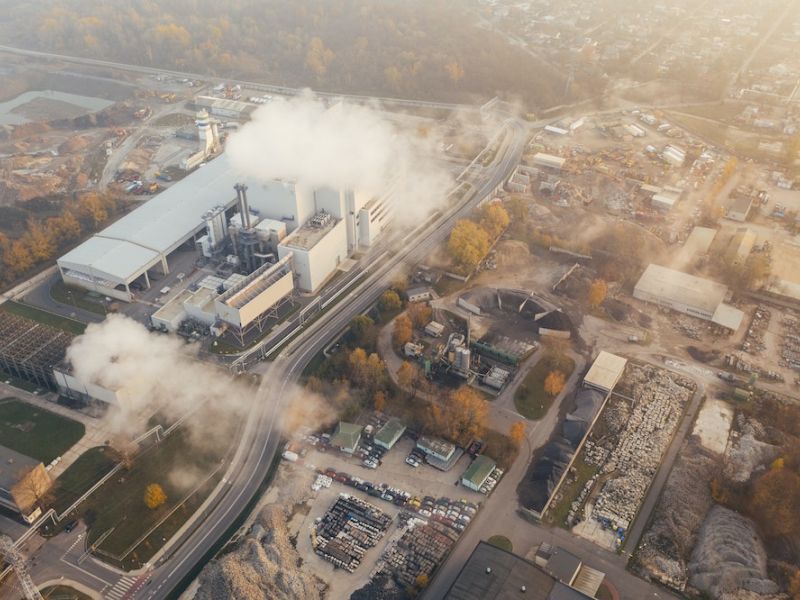
A Guide to Commercial Energy Performance Certificates (EPCs)
Knowing whether or not you need a commercial Energy Performance Certificate (EPC) for your business is essential. Within this post we’ll take a closer look at how commercial EPCs work, as well as the types of buildings that are required by law to have one.
If you are to take away one key point from this article then always remember that whenever a commercial property is constructed, sold, or rented out, UK law often requires an Energy Performance Certificate (EPC).
Let’s dive right in so you know everything you need to know about commercial EPCs
Quick Navigation:
- What is a Commerical EPC?
- How long is a Commercial EPC Valid for?
- Are EPCs mandatory for Commercial Properties?
- What are the benefits of Commercial EPCs?
- When is an EPC required for a Commercial Property?
- When is an EPC not required for a commercial property?
- When is a New Build EPC Required?
- What are the EPC requirements for subdivided properties?
- Are there penalties for not having an EPC?
- Are there requirements to display a commercial EPC?
- What is the minimum EPC rating for a commercial property?
- Why is it important to improve your EPC rating?
- How long does a Commercial EPC assessment take?
- What does an EPC assessment involve?
- Who is responsible for ensuring a commercial EPC is in place?
- How much does a commercial energy assessment cost?
- How do I obtain a Commercial EPC certificate?
What is a Commercial EPC?
A commercial Energy Performance Certificate (EPC) rates how energy efficient a commercial premise is on a scale of A-G, with A being the most energy efficient and G inefficient. Energy efficiency is measured by total carbon emissions that a commercial premise produces. These ratings give an indication of the costs of powering the property and how high its carbon emissions may reach. It is a different certificate than one that is produced for domestic properties.
How long is a Commercial EPC valid for?
A Commercial EPC is valid for 10 years.
Are EPCs mandatory for Commercial Properties?
Yes, for buildings that qualify, having and displaying an EPC is a legal requirement for qualifying businesses in the UK.
What are the benefits of Commercial EPCs?
In addition to the legal requirements, energy efficiency levels are gauged when an EPC is produced, and commercial landlords receive a recommendation report that outlines how improvements might be made to their energy rating.
Understanding the energy performance of commercial premises allows landlords to gauge how much their utility costs may be. It also allows for potential buyers or new tenants who lease the property to understand their potential energy bills.
EPCs are another piece of energy legalisation that encourage commercial property owners and businesses to think about their net zero strategy as they encourage energy efficient practices.
Commercial EPC Requirements
When is an EPC required for a commercial property?
Business owners will need a commercial EPC under the following circumstances:
- when selling, leasing (but not where it is merely a lease renewal), or constructing a business premise
- where there are changes to the number of parts used for separate occupation and these changes involve providing or extending fixed heating, air conditioning or mechanical ventilation systems
There must be a valid EPC provided to any prospective tenants or buyers no later than the viewing of the property. Other related materials and written information must also be provided at this time.
“New Build” properties will also need to obtain a separate Energy Performance Certificate called an ‘On Construction Certificate’. Review and approval for this certificate must be arranged by the person carrying out the work to meet building regulations.
When is an EPC not required for a commercial property?
There are a few exceptional cases where exemptions are made and an EPC is not required:
- If there are plans for the building in question to be demolished and the landlord can demonstrate that:
- The building is suitable for demolition
- The site after the demolition will be in a usable condition for future redevelopment
- Planning permissions, listed building consents and conservation area consents exist regarding the demolition
- If the building is being sold that the prospective buyer or tenant intends to demolish the building
- If a building is Listed or officially protected and the minimum energy performance requirements of the report would unacceptably alter the building
- If a building is temporary, with less than two years of usage or occupancy
- If a building is entirely detached, with a total useful floor area of less than 50m2 (and not a personal or domestic dwelling)
- If a building acts as a place of worship or other religious activities
- If a building is an industrial site, workshop, or non-residential agricultural building with low energy demand.
When is a New Build EPC Required?
A New Build EPC must be provided once the construction of a commercial building is complete. The person or company completing work on the building is responsible for supplying the property owner with an EPC and recommendation report, as well as notifying building control. Note that building control will not issue a certificate of completion until they are satisfied that all appropriate steps have been taken, and that the building process is complete.
Building rules and regulations will differ among regions, which makes it important to choose an accredited assessor who understands the regional conventions for compliance. It is recommended that you involve an assessor as soon as possible in the building design process, who can identify potential energy efficiency issues that will help to prevent the possibility of wasting money.
What are the EPC requirements for subdivided properties?
If a building is designed or restructured for use as a type of campus, where there are multiple buildings with different functions that perform individual activities, or separate accommodation (multiple hotels in one building for example), each commercial entity within the building, or each part of the building may require its own EPC. Whether such a commercial building requires a single or multiple EPC depends on the type of heating system they use, or on future plans for the property.
When a property owner intends to sell or rent out an entire building, a single EPC may be obtained for the whole building; however, separate heating systems within one building require multiple EPCs, including communal areas. The exception to this is if a building owner sells or rents only part of a building which shares a common heating system with the rest of the building. In this case, one EPC is sufficient for the whole building or each designated area, and common areas may be ignored.
A building with separate parts and separate heating systems will need a single EPC for each part being offered for sale or rent. There must also be an EPC for conditioned communal areas or the property owner can request one for the whole building.
When a self-contained residential space is only accessible via the commercial property, such as in the case of apartment complexes, a domestic EPC will be required in addition to a commercial EPC.
Are there penalties for not having an EPC?
If an EPC is not ready for review when required, the builder or owner will incur a penalty of 12.5% of the value of the property (minimum of £500 to a maximum of £5,000). If this formula cannot yet be applied, the penalty defaults to a fee of £750, with an EPC required for purchase in the immediate future.
Are there requirements to display a commercial EPC?
If a commercial building with a floor area greater than 500 square metres is regularly accessed by the public, it is mandatory to display the EPC in a noticeable location so it’s easily visible to visitors. Failure to do so can result in a £500 fine.
What is the minimum EPC rating for a commercial property?
Starting from April 1st, 2023, Minimum Energy Efficiency Standards (MEES) require that commercial landlords in England and Wales must ensure that both new and existing lettings have an EPC rating of E or higher. You will not be allowed to let a commercial property with an EPC rating of F or G, even if the lease was granted prior to the new MEES regulations.
Previously the minimum EPC rating was just for new leases and did not apply to existing leases. Now landlords will be prohibited from continuing with an existing tenancy if the EPC rating is below an E ranking. As per the current roadmap, a C rating will be mandatory by 2027, and a minimum rating of B will be required starting from 2030.
If your EPC rating is below E or the subsequent future minimum requirements you will want to be prompt in upgrading your commercial properties’ energy rating. There may be significant consumption reducing strategies you will need to perform and these can incur costs and it would be wise to budget accordingly. There are many options available for commercial premises to improve their EPC ratings on site and support is available from the government with loans, grants and other subsidised energy saving methods.
Why is it important to improve your EPC rating?
Making improvements to achieve higher EPC ratings may lead to increased rental income for property owners and landlords. This is because you can expect lower utility costs with improved energy efficiency and reduced consumption and potentially fewer maintenance issues, as more efficient buildings are less likely to experience unexpected breakdowns. For instance, a new boiler is less likely to fail than one that is decades old.
In addition to the above, the demand for environmentally friendly commercial property may increase in the market. This has been witnessed in the residential sector where tenants have expressed willingness to pay more for sustainable homes, similarity, businesses may also experience the same demand in the coming years as they search for the most environmentally friendly offices available to improve their corporate social responsibility with low carbon strategies. Therefore an improved EPC will also increase the value of the property.
How long does a Commercial EPC assessment take?
The size and complexity of a project determine the commercial assessment required. Professional Energy Services (PES) strives to produce Commercial EPCs within a turnaround time of 2-3 working days from preparation and reviewing the commercial site.
Professional Energy Services recognizes the importance of delivering the commercial EPC and the certificate on schedule. We make every effort to produce the certificate within the requested timeframe of our clients.
What does an EPC assessment involve?
An EPC assessment is carried out by a qualified energy assessor who will inspect the property and gather information about its construction, insulation, heating, and lighting systems.
During the assessment, the energy assessor will take measurements and gather data on various aspects of the building, such as the type and thickness of insulation, the age and efficiency of the heating system, and the type of windows and doors. They will also consider factors such as the building’s orientation, its use of renewable energy sources, and the amount of ventilation.
Once all the necessary information has been collected, the energy assessor will use specialized software to calculate the building’s energy efficiency rating and produce an Energy Performance Certificate.
Who is responsible for ensuring a commercial EPC is in place?
Landlords (the business owner of the property) are responsible for ensuring a commercial EPC is in place and not the tenant or buyer, and will pay for its completion.
How much does a commercial energy assessment cost?
If you decide to conduct an energy audit which is recommended, not only will you get a more accurate EPC rating, you will also experience many other benefits, an energy audit will cost around 1% of your total energy bills according to the Department of Energy & Climate Change. Then an additional cost is incurred for the production of the certificate by a qualified energy assessor. This is not a fixed price and can vary depending on the size and complexity of the building, an estimate would be a range of £120-£200 for commercial properties.
How do I obtain a Commercial EPC certificate?
Commercial EPCs are granted by qualified energy assessors as mentioned above. It is also advisable to conduct an energy audit to get a more detailed understanding of consumption across all sites. Professional Energy Services has its own assessors who possess all the necessary qualifications, experience, and accreditation, including Insurance and Disclosure checks, to create Commercial EPCs. Contact a member of our team if you require an EPC for your commercial properties.
Related Posts

Display Energy Certificates – Everything you need to know

62 Tips to Reduce Energy Consumption in your Business
